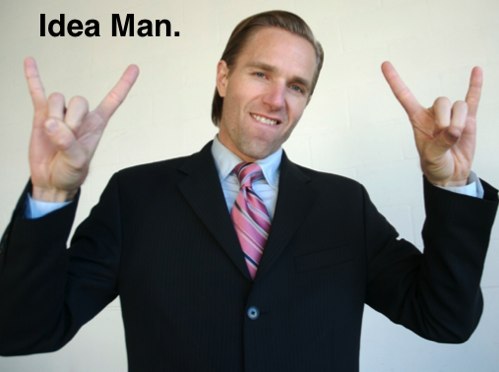Merlin’s weekly podcast with Dan Benjamin. We talk about creativity, independence, and making things you love.
BlogsTask Times, The Planning Fallacy, and a Magical 20%Merlin Mann | Aug 13 2008Overcoming Bias: Planning Fallacy Via The Guardian, via Chairman Gruber, comes this post from the new-to-me blog, Overcoming Bias. It discusses the research behind a common cognitive bias known as The Planning Fallacy, which is a repeatable, documented error in thinking that apparently explains why we all tend to "underestimate task-completion times." It's summed up nicely by Gödel, Escher, Bach author Douglas Hofstadter's Law regarding the time it takes to do anything:
Sounds familiar. From the Overcoming Bias post:
Cf: The Optimism Bias. read more »POSTED IN:
Gmail Outage or: How I Learned to Stop Worrying and Love GTD ContextsMerlin Mann | Aug 12 2008Like thousands of people yesterday, I was annoyed and inconvenienced by Gmail's unexpected 2-hour dirtnap. But, wow. Apparently, it just irrevocably hijacked the whole day for some folks. And even sent a few into a Dark Afternoon of the Soul that most 19th-century Romantic poets would have found a bit histrionic. Now, as a user, polemicist, and nemesis of Apple's MobileMe problems, I'm not here to criticize the frustration about a broken cloud service; I know that feeling all too well and have the dents in my wall to prove it. But, I do want to talk about some strategies you can choose to employ whenever a change in access to anything unexpectedly rearranges your day. Because things do break, and there's no reason you have to break with them. read more »POSTED IN:
Ideas, Execution, and the Rare AuteurMerlin Mann | Aug 11 2008ideas are just a multiplier of execution - O'Reilly ONLamp Blog Derek Sivers' short blog post from 2005 has been making the rounds lately -- it came to me via Chairman Gruber -- and I have to say, I can't stop thinking about it. I think this is really profound thinking around the fundamental misunderstanding many people have about the value of ideas. In a nutshell, Derek says ideas are valuable only inasmuch as they can be multiplied by execution. So, if you remember your 3rd grade arithmetic, you can figure out the product of even the most fantastic idea when it's multiplied by zero execution. I, too, frequently encounter this attitude of "Sign the NDA! Sign the NDA!" any time someone wants to tell me about their squirrelly idea for making a bajillion dollars on the internet, and I almost always end up saying the same six things to The Idea Men: read more »POSTED IN:
Berkun's Game-Changer: Disruptive, Breakthrough Essay on Transformative Jargon Utilization.Merlin Mann | Aug 11 2008Why Jargon Feeds on Lazy Minds - Scott Berkun
Marry me, Scott. (And, yes: I, for one, will stop saying "game-changer" now. Tic noted.) Orwell's excellent 1946 essay is freely available in numerous locations and in various formats across the web. I like this vanilla version. [via delicious/charliepark] read more »POSTED IN:
Foo for Bar: Kicking Ass with Outcome-Based ThinkingMerlin Mann | Aug 8 2008The other day, I was talking with someone who is trying to encourage a Getting Things Done-like work approach amongst the people on his team. We started talking about which parts of David Allen's GTD system appear to have the greatest long-term impact on the people who have adopted it and who ultimately stick with it for years. When asked to distill everything down to its most powerful concepts, I came up with three, and here's how I'd summarize each:
While I think stuff like ubiquitous capture, the Natural Planning Model, the Two-Minute Rule, and many other bits are arguably as important, these are the three things that I feel have the biggest impact on how people's results change over time. read more »POSTED IN:
Making Time to Make: One Clear LineMerlin Mann | Aug 6 2008
This article is Part 3 of a 3-part series about attention management for people who do creative work called, Making Time to Make.
The point, from my perspective, is that Stephenson possesses the man-sized pant stones to declare precisely what the people who enjoy his work should expect from him. And, in so doing, he has drawn a clear line that some might find hard to love, but that is very easy to see, understand, and respect. No, he didn’t hire someone to answer his email, or get a kid to pretend to be him on Twitter, or install a Greasemonkey script that “autopokes” people on Facebook (I’ll leave you to guess which two of these I do). Neal Stephenson essentially said, “Listen, gang, here’s what I’m going to make for you: novels.” And then, he went back to typing. To working. On work. read more »POSTED IN:
|
|
| EXPLORE 43Folders | THE GOOD STUFF |




